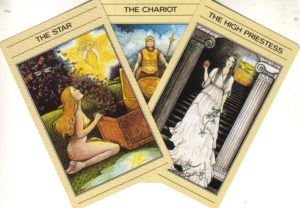Why Tarot?
 It’s very simple. Tarot helps people. That’s why.
It’s very simple. Tarot helps people. That’s why.
Initially, the tarot was for my personal use only. I charted my goals and planned out how I would pursue my ambitions with the aid of tarot. I found that tarot helped me stay on track, stay focused, and achieve exactly what I want to achieve. It also helped console me in times of grief, loss, and confusion. When the words and advice of well-meaning people couldn’t help relieve my pain, I found that the tarot could. For me, tarot has always been about self-empowerment.
Then friends would visit my home from time to time and if I wasn’t careful, my cards or crystals would be lying around and of course, they would inquire about them. I would tell them that I study tarot. They may ask a few questions about what tarot is and I’d answer. Later on in time, for reasons unbeknownst to me, some of those friends would remember me in their times of need. They would ask me if I would read the tarot for them, and I would. That was when I saw firsthand how powerful and therapeutic the tarot could be.
Throughout the ages, the greatest leaders of human history have sought out oracles for counsel, especially in critical times. In a way, tarot can serve as an oracle, but that’s not what it really is. That is just a simplified explanation of how it functions. In truth, tarot is a mirror. It reflects back who you are. It shows you your strengths and your weaknesses. It makes you confront the decisions you have made in the past, your attitude, both good and bad, and how these components have affected your life as you know it. Somehow, just the right archetypes are selected each time to help you understand what you need to do to advance forward. It’s uncanny how tarot does that and I have no concrete explanation for why exactly it works, but it does. It tells you exactly what you need to hear to go on (though rarely does it tell you what you want to hear; such is life).
Tarot is essentially a diagnostics tool for decision-making. I am one of those people who creates checklists, to-do lists, action items, and who is neurotically organized when it comes to charting from any given Point A to my desired Point B. And personally and professionally I have found tarot to be an incredible supplement to that neuroses. Hence, I practice tarot.
My Approach to Tarot
 People who know me through my identity as a business executive and a Ph.D. Life Coach and who also learn of my tarot practice always ask me how I got into tarot in the first place. Wouldn’t a person who grounds all of her analyses on provable facts and cold logic be turned off by divination frou-frou like tarot? No. Tarot is a psychological tool. It helps us tap into our subconscious. Through symbols and universal archetypes, we borrow the imagery of the tarot cards to help us unlock the parts of our minds that already contain the answers.
People who know me through my identity as a business executive and a Ph.D. Life Coach and who also learn of my tarot practice always ask me how I got into tarot in the first place. Wouldn’t a person who grounds all of her analyses on provable facts and cold logic be turned off by divination frou-frou like tarot? No. Tarot is a psychological tool. It helps us tap into our subconscious. Through symbols and universal archetypes, we borrow the imagery of the tarot cards to help us unlock the parts of our minds that already contain the answers.
Plus, yes, the skeptic in me would have been completely turned off by tarot… if there wasn’t so much unexplainable synchronicity about it… if the game of chance conformed with what we knew about probability, except it doesn’t… if those I’ve read tarot for didn’t consistently go, “whoa, what just happened there… how did you know that…” I’m not asking you to believe me or take my word for it. I’m asking you to try tarot out for yourself. Experience the synchronicities and confirm for yourself everything I’ve said.
A friend of mine put it so well that I’d like to quote her: “Whatever case may be made for or against tarot’s predictive power, it has great explanatory power if you are open to it. That is, whether or not it ‘corresponds to’ reality is moot if you believe that we create our own reality—or story—to some extent, and a tarot reading gives you a story through which to see the world.”
Tarot is steeped in history, cultural knowledge, and is a science of the mind. The tarot reader is not a mystic, not a fortuneteller, and not a clairvoyant. The tarot reader could be you or it could be me, but he or she is someone who has taken the time to study tarot, practice tarot, and with that knowledge and experience, is there to help you relate to the tarot cards and find your own meaning. At his or her most effective state, the tarot reader is a conduit, and at most, the tarot reader is erudite, someone who has taken the time to learn a field and apply that scholarship to help others solve their problems through an analytical process that involves archetypal imagery.
Educating people about tarot is important to me. The ignorance of it induces fear, discredits the intellectual or even emotional stability of those who consult tarot, and denigrates tarot to a mere superstitious indulgence of old maids and cult followers. That is the opinion most people form before they have taken any time at all to understand what exactly tarot is. Thus educating people so that they may adopt informed judgments is an important mission to me.
